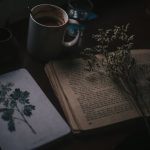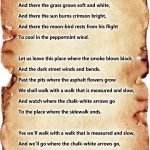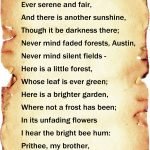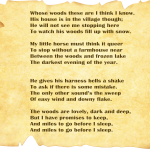Bald heads forgetful of their sins,
Old, learned, respectable bald heads
Edit and annotate the lines
That young men, tossing on their beds,
Rhymed out in love’s despair
To flatter beauty’s ignorant ear.
All shuffle there; all cough in ink;
All wear the carpet with their shoes;
All think what other people think;
All know the man their neighbour knows.
Lord, what would they say
Did their Catullus walk that way?
This poem from The Wild Swans at Coole means a great deal to me because it reminds us that poetry is an Art and a passion before it is anything else. In this piece, Yeats evokes the blinkered academic, furiously analysing – “edit[ing] and annotat[ing]” – the dry pages of tomes full of poetry that was “Rhymed out in love’s despair” by “Young men, tossing in their beds.” The Scholars is a spot-on, well-aimed jab at literary critics, but also a very pertinent comment on the nature of poetry.
I love the contrast between the bald heads – those “Old, learned, respectable bald heads” – and the young poets rhyming out “in love’s despair”. Notice how the scholars don’t seem to have bodies; they’re just heads. The “young men” are living their lives, and experiencing every moment of it intensely. Their writing is what Wordsworth described as “the spontaneous overflow of powerful feelings”. The way the scholars are described as annotating and editing suggests they manipulate the verse to fit their purpose (which critics often do).
“All shuffle… all cough in ink”, Yeats tells us. The shuffling certainly amplifies this idea of quiet living – blinkered living – and the coughing brings to my mind a person that almost ignores the needs of his body because he is so deeply buried in his books. “All think what other people think”; these scholars seem to be dictated to by tradition, and pressure about what is the ‘right’ literature to venerate.
When we come to the end of the piece, Yeats poses us a question: “Lord, what would they say/ Did their Catullus walk that way?” I like this very neat ending. If Catullus (a Roman poet, known for his love poems) had been as dry, as hermit-like, and as studious as Yeats’ scholars, what on earth would his poetry have been like? Without experience – without a life – without at least some kind of passion – a poet is nothing, because it is in moments of intense emotion that poems are ‘born’, even if they are completed and polished in a calmer state (or “in tranquility” to quote Wordsworth’s Lyrical Ballads again).
As you can probably tell from this blog, I kind of like literary criticism. I love to read about writers and their techniques; I love to take a poem and really get to grips with it and work out how and why it’s such a marvel because I love poetry. But The Scholars reminds us that the greatest literary theorist cannot necessarily write a poem, and the greatest poets need not by any means be academics. On the contrary; the poet is an artist. Yeats certainly was.
Reviewed by Emily Ardagh



